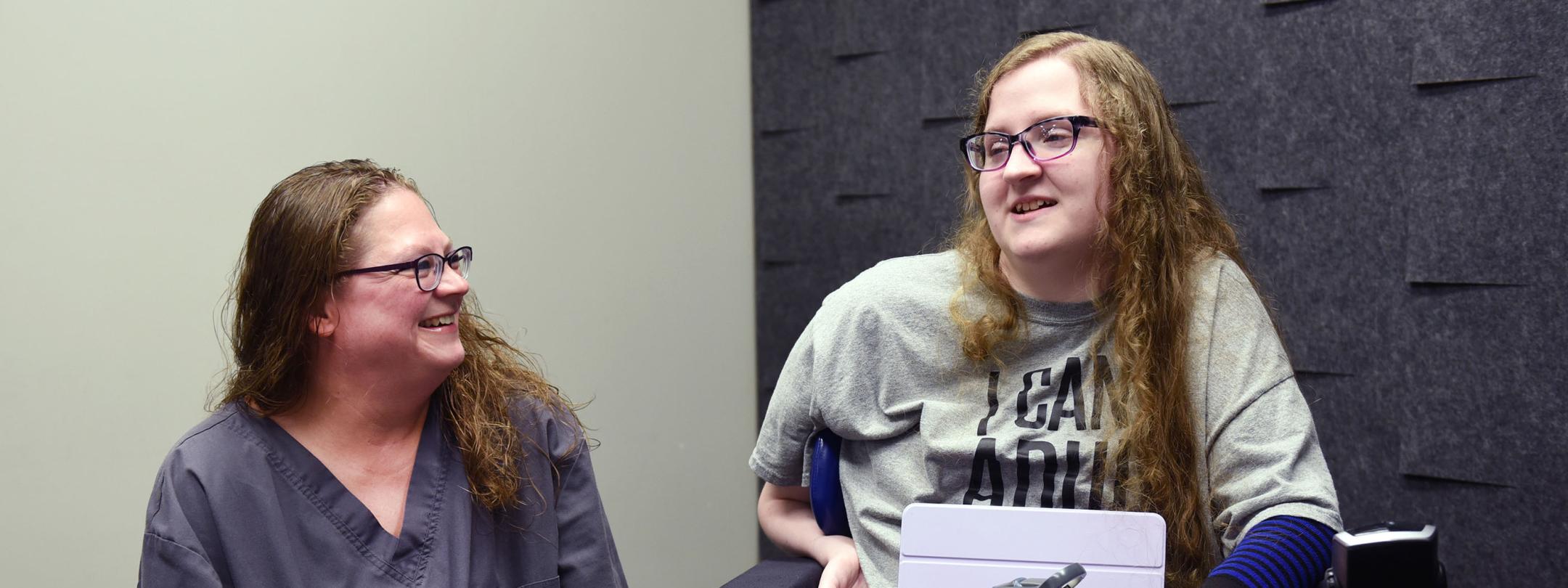
Future educator guided by spirit and strong will
By Blake Sebring
November 15, 2023
Elizabeth Farlow woke up on Jan. 15, 2015, feeling a twinge in her shoulder blade. After the pain worsened while she was in the shower, her parents suggested she lie down after taking a couple of pain relievers.
A short time later, Farlow found herself unable to reach over to shut off an alarm that had just sounded. She had no strength in her neck muscles, a little movement in her arms at the elbows, but no control.
After eliminating everything else, doctors suggested transverse myelitis, a spinal cord inflammation that sometimes happens two weeks after infections or in people with autoimmune diseases. Though Farlow had not been sick, tests showed pneumonia antibodies in her spinal fluid.
Regardless, Farlow, who’s now a sophomore at Purdue University Fort Wayne, has been paralyzed from the chest down since age 11. Since then, she’s needed to use a wheelchair but has never allowed it to contain her.
Farlow remembers her fifth-grade classmates sending cards and gifts with a few of the notes suggesting they wished it happened to them instead.
“The reality is, I wouldn’t wish this on anyone,” Farlow said. “I told people I was glad it was me and not any of my friends or family. I think I was able to handle it better than most. I’m told that it is special, and I realize that it is, but what else would I do? I can’t do anything about it except try to push past it.”
She credits her parents, who quickly say they handled it well because she has. Farlow focuses on the things she can control, learning to write left-handed, though she’s a natural righty, and typing with her knuckles. She doesn’t allow her body’s limitations to dominate, instead choosing her goals and working to get there. She’s still regaining some functions, something doctors said would cease after two years.
“I don’t like to be defined,” Farlow said.
Try to put her in a box, and she’ll likely respond with a biting wit. One of her favorite T-shirts says, “I like sarcasm, it’s like punching people in the face but with words.”
With help from the Disability Access Center’s programs and resources, Farlow has found PFW to be an accommodating place. According to DAC statistics, the number of PFW students dealing with disabilities has increased annually from 283 in 2020–21 to an expected 550 by the end of this academic year.
“Everyone I have talked with has been extremely kind and helpful, especially the DAC,” she said. “The DAC has given me many accommodation options, but I try to be as independent as possible so I don't use them as much as I could. However, in the process of setting up my accommodations, they were very helpful and walked me through what accommodations I had available to me.”
That spirit and strong will showed when Farlow walked across the stage at her Carroll High School commencement. It took four years of therapy, help from two physical trainers, and her stubbornness, but Farlow made it all the way across, head held high. That was something she could control, and she loves challenges.
“She has never said, ‘Why me?’ or anything else,” Farlow’s mother Hope Farlow said. “Thank heaven she was never like that. She has pretty much always been smiling. She loves people.”
Her daughter’s outlook is one reason why Farlow is becoming a math teacher, inspired by those she had along the way. She recalls after missing a few weeks because of physical problems, her high school math teacher said, “I don’t want you to worry about my class. I know you have other classes to catch up, so worry about mine the least.”
Farlow loved math and being able to help her friends understand the problems, thriving on finding different ways to explain the equations until the obstacles fell away. Another teacher told her that everyone learns differently.
“She taught us in different ways until we got it,” Farlow said.
Now Farlow wants to become that teacher. She considered science, Spanish, and psychology, but math gradually became her calling. She’s adjusted and tried different things to make it all work, and this will simply be another way.
“I think one of the reasons why I'm so driven to help people is because of the many people that have helped me,” Farlow said. “Since I became paralyzed, there have been countless nurses, therapists, doctors, friends, family, and even strangers who have been extremely kind to me and have helped me achieve my goals. Their actions made me feel happy and grateful, but even that doesn't fully encapsulate the complexity of the feelings. In helping people, I want the opportunity to share those feelings with others.”




